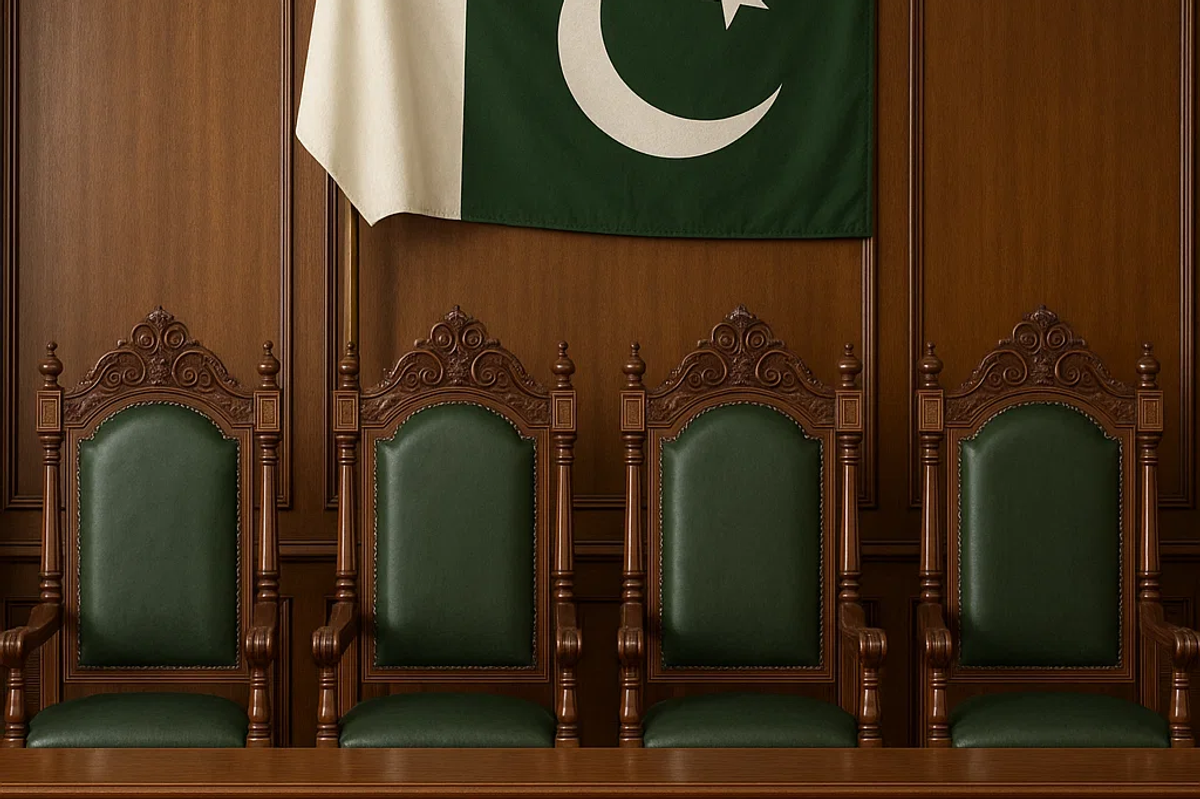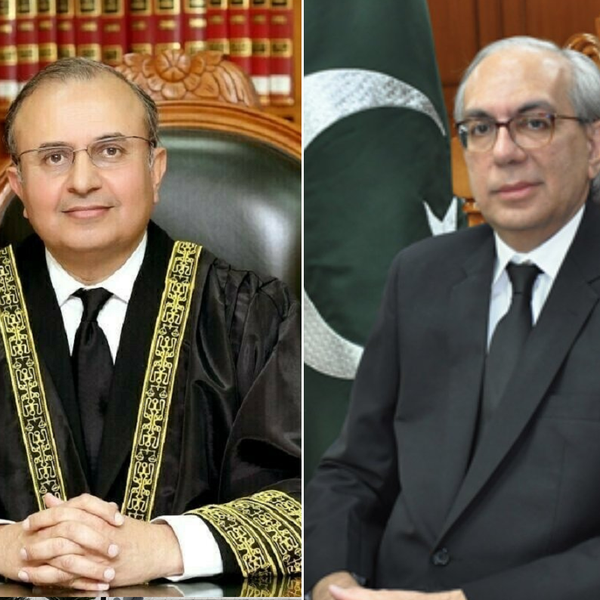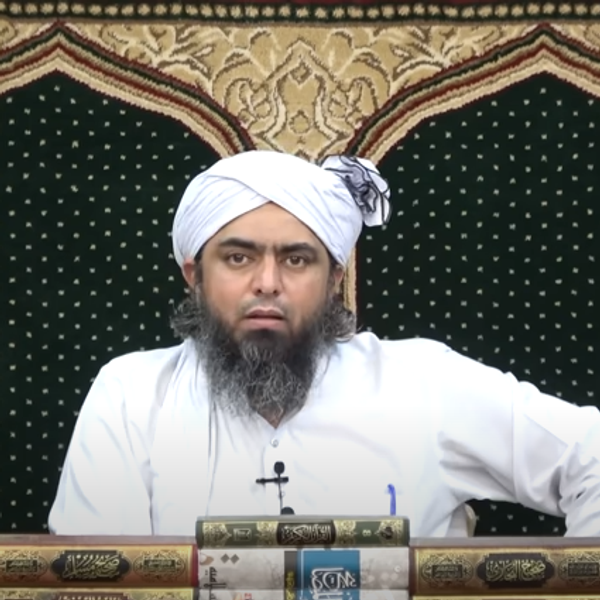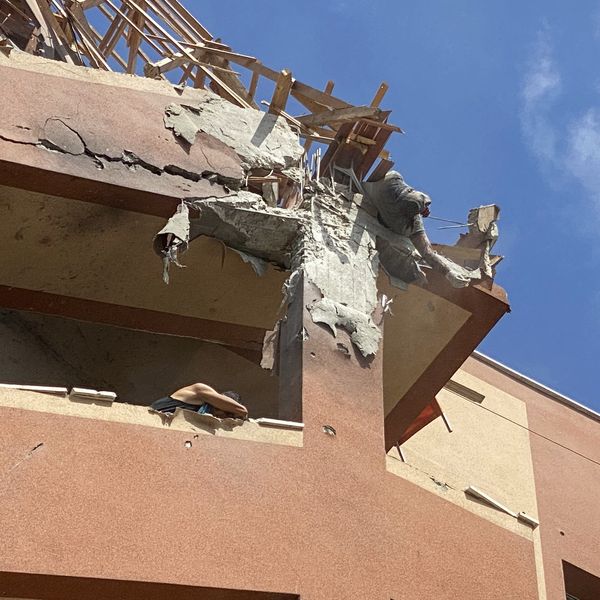Pakistan’s top judicial body meets today to decide chief justices for four high courts
Legal experts who spoke to Nukta remain divided over whether the president has the authority to determine judicial seniority
Ali Hamza
Correspondent
Ali; a journalist with 3 years of experience, working in Newspaper. Worked in Field, covered Big Legal Constitutional and Political Events in Pakistan since 2022. Graduate of DePaul University, Chicago.

An AI-generated image of a Pakistani courtroom with four empty chairs and national flag.
Nukta
Pakistan’s top judicial forum will meet Tuesday to decide on the permanent appointments of chief justices for four major high courts — Islamabad, Peshawar, Balochistan, and Sindh — in a process closely watched amid a simmering dispute over judicial seniority and constitutional authority.
The session will begin at 3:30 p.m., focusing on the appointment of the chief justice of the Islamabad High Court. Justice Sardar Sarfraz Dogar, whose controversial transfer from the Lahore High Court has already triggered backlash, is the leading candidate based on a seniority list approved by the president. Also under consideration are Justice Mohsin Akhtar Kayani and Justice Miangul Hassan Aurangzeb.
Three additional meetings have been scheduled to finalize appointments for the provincial high courts: the Peshawar High Court at 2 p.m., the Balochistan High Court at 2:30 p.m., and the Sindh High Court at 3 p.m.
Judge transfers trigger seniority rift
The appointments come against the backdrop of a February letter penned by five Islamabad High Court judges -- including Justices Mohsin Akhtar Kayani, Tariq Mehmood Jahangiri, Sardar Ejaz Ishaq Khan, Babar Sattar, and Saman Rafat Imtiaz -- addressed to Chief Justice of Pakistan Yahya Afridi and senior justices of other courts.
The judges strongly opposed permanent transfers to the Islamabad High Court under Article 200 of the Constitution, warning that such moves undermined judicial independence and violated constitutional norms. They cautioned that allowing such transfers would set a “pernicious precedent” with far-reaching implications.
Tensions escalated after the Ministry of Law and Justice, on February 1, issued a notification transferring Justice Dogar from the Lahore High Court, Justice Khadim Hussain Soomro from the Sindh High Court, and Justice Muhammad Asif from the Balochistan High Court to the Islamabad High Court — an action that altered the existing seniority order and raised serious concerns among sitting judges.
In a rare act of protest, the five judges boycotted the oath-taking ceremony for Justice Dogar’s appointment as acting Chief Justice of the Islamabad High Court. Departing from tradition, President Asif Ali Zardari personally administered the oath — a role typically carried out by a senior judge.
Subsequently, the protesting judges petitioned the Supreme Court, questioning whether such transfers reset a judge’s seniority and whether due process under the Constitution had been followed.
Last Thursday, Pakistan’s Supreme Court delivered a 3-2 majority ruling upholding the presidential notification and declaring the transfers of the three judges to the Islamabad High Court legal and constitutionally valid — effectively rejecting the petition filed by the dissenting judges.
Experts differ over presidential powers
However, legal experts who spoke to Nukta remain divided over whether the president has the authority to determine judicial seniority.
Supreme Court Bar Association President Mian Rauf Atta defended the president’s actions, noting that Zardari was acting in line with the Supreme Court’s written directive instructing him to resolve the seniority issue. “These are mere allegations by an investigative agency. On that basis alone, the president cannot be barred from carrying out constitutional duties,” Atta said.
A similar stance was echoed by Syed Wajid Gilani, president of the Islamabad High Court Bar Association. “Zardari has faced such allegations before — even during his previous presidency — and continued to perform his duties. The same applies now,” he said, adding that if any judge had reservations, “they should pursue legal remedies through proper judicial forums.”
However, Riasat Ali Azad, former president of the Islamabad High Court Bar Association, sharply criticized the move in an interview with Nukta. “Morality and ethics are long gone in our country,” he said. “Under Article 200, the president has no authority to determine the seniority or permanent postings of judges — unless there’s a 27th constitutional amendment.”
Azad contended that the president’s notification was “malafide,” describing it as a misuse of power and a distortion of constitutional procedure. He stressed that every high court enjoys administrative autonomy, and the respective chief justice determines the seniority of judges. In this case, Dogar — as acting Chief Justice — lacked the authority to make such decisions, and the Constitution remains silent on who would resolve such a situation.
“This is a separate and unresolved question of law,” he said, calling for the appointment process to restart in light of the Supreme Court’s ruling remanding the matter to the president.










Comments
See what people are discussing